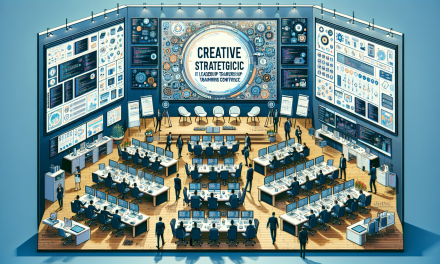Table of Contents
- 1. Introduction
- 2. Understanding Change Management
- 3. The Importance of HR Professionals in Change Management
- 4. Strategic Approaches to Change Management
- 5. Essential Tools and Techniques for Change Management
- 6. Successful Case Studies in Strategic Change Management
- 7. Attending Conferences: The Road to Success
- 8. Frequently Asked Questions (FAQs)
- 9. Conclusion
1. Introduction
Change is a constant factor in today’s dynamic business environment. For HR professionals, understanding and navigating this reality is crucial to driving organizational success. Indeed, effectively managing change involves not only strategic planning but also adept interpersonal skills, agile processes, and robust tools. In light of this, the Strategic Change Management Conference for HR Professionals offers invaluable insights and networking opportunities tailored specifically for experts in human resources. This event focuses on equipping participants with knowledge and strategies to effectively steer their organizations through change.
2. Understanding Change Management
At its core, change management refers to the actions taken to prepare for the transition from current operations to future states. It involves understanding the impact of changes in processes, technologies, and organizational structures. By recognizing that people are at the heart of change, HR professionals can more effectively foster a culture that embraces change. Additionally, a well-defined change management strategy helps minimize resistance and enhances the likelihood of successful implementation.
Importance of Change Management
Organizations that prioritize change management will often experience more productive work environments. Consequently, employees feel more secure and valued when they’re included and their input is considered throughout the transition process. Moreover, effective change management leads to improved engagement, higher retention rates, and ultimately better organizational performance.
3. The Importance of HR Professionals in Change Management
HR professionals play a pivotal role in successfully navigating change initiatives. They act as change agents who champion the cause, ensuring that all employees understand the need for organizational shifts. Furthermore, HR professionals are integral in establishing clear communication pathways, providing updates, and addressing concerns. As trusted leaders within the company, they can leverage their skills to help cultivate a resilient workforce, thereby making transitions smoother and less challenging.
Key Responsibilities
- Assessing the impact of change on personnel.
- Facilitating open communication between management and staff.
- Providing support and training during the transition period.
- Monitoring employee morale and adapting strategies as needed.
4. Strategic Approaches to Change Management
When managing change strategically, HR professionals can adopt various approaches to ensure smooth transitions. Some prevailing methods include:
1. The Kotter’s 8-Step Process
This robust model outlines an effective roadmap for instigating and managing change. It begins with establishing a sense of urgency, forming a guiding coalition, and creating a vision for change, followed by actively communicating the vision.
2. ADKAR Model
The ADKAR model symbolizes Awareness, Desire, Knowledge, Ability, and Reinforcement. It focuses on guiding individual change through these five steps, ensuring that employees remain engaged and motivated.
3. Lewin’s Change Model
This classic model emphasizes three essential stages: Unfreeze, Change, and Refreeze. Each stage tackles different aspects of the change process, allowing HR professionals to guide their organizations through transitions efficiently.
5. Essential Tools and Techniques for Change Management
Implementing effective change management requires the right tools and techniques. Some resources HR professionals may find beneficial include:
1. Change Management Software
Various software solutions can streamline the change management process by offering features such as project tracking, reporting, and collaboration tools.
2. Surveys and Feedback Mechanisms
Gathering feedback from employees helps organizations gauge the effectiveness of change initiatives and identify areas needing improvement.
3. Workshops and Training Sessions
Investing in workshops and training allows HR professionals to equip staff with the skills needed to navigate change confidently.
6. Successful Case Studies in Strategic Change Management
To illustrate the power of effective change management, consider the following case studies:
1. Company A: Digital Transformation
Company A, a midsize firm, faced challenges during its digital transformation. By implementing strategic change management techniques, they improved communication among departments and minimized resistance. As a result, they achieved their objectives ahead of schedule.
2. Company B: Culture Shift
Company B embarked on a culture shift to enhance employee engagement. By utilizing the ADKAR model, they achieved widespread buy-in and elevated overall morale, leading to a significant increase in productivity.
7. Attending Conferences: The Road to Success
Participating in relevant conferences is crucial for HR professionals aiming to stay at the forefront of change management. Events such as the Strategic Change Management Conference for HR Professionals offer opportunities to learn from industry experts, network with peers, and exchange innovative ideas.
Benefits of Attending Conferences
- Access to the latest research and trends in change management.
- Networking opportunities that can lead to collaborations.
- Workshops and breakout sessions promoting skills development.
- Inspiration from success stories shared by other professionals.
Related Conferences
If you are eager to expand your knowledge on various aspects of management, consider these conferences as well:
- Mastering Budget Management for a Successful Business
- Unlocking the Future of Safety: The Advanced Process Risk Assessment Conference
- Unlocking the Secrets of Effective Project Scope and Requirements Management
- The Ultimate Guide to Procurement and Supply Chain Management
- Enhancing Reliability in Process Equipment Piping Systems
8. Frequently Asked Questions (FAQs)
What is strategic change management?
Strategic change management is the structured approach to transitioning individuals, teams, and organizations from a current state to a desired future state. It involves the application of processes and methodologies to facilitate change while minimizing resistance.
Why is change management important for HR professionals?
Change management is integral for HR professionals as they help facilitate transitions within their organizations. By effectively managing change, HR contributes to a positive workplace culture, ensures employee engagement, and enhances overall organizational productivity.
How can I improve my change management skills?
Improving change management skills can be achieved through attending relevant conferences, engaging in workshops, and networking with other professionals in the field. Learning from case studies and industry experts also provides practical insights.
9. Conclusion
In an era where change is an inevitable part of organizational life, effective change management becomes a vital skill for HR professionals. By adopting strategic approaches, leveraging essential tools, and participating in conferences, HR professionals enhance their ability to lead their organizations through transitions smoothly. As the landscape continues to evolve, those who invest in improving their competencies in change management will find themselves well-prepared for whatever the future holds.





